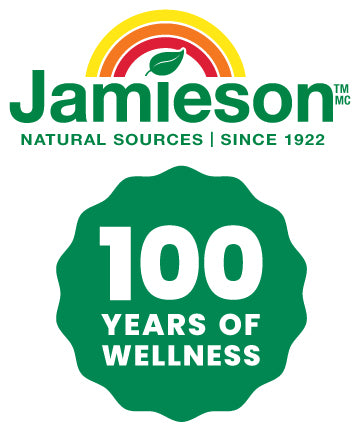Colder weather welcomes germs, so it’s only a matter of time before the immune system needs to start revving up. The immune system is like an army - tirelessly locating, identifying, and fighting back against invaders like viruses and bacteria. The immune system works around the clock, so it’s no surprise this mighty army needs reinforcements to ensure victory. That's where vitamins and herbs can help support and strengthen the immune system. Here are the ones you need to stock up on:
- Vitamin C
Vitamin C plays various roles in ensuring the immune system does its best work. Firstly, vitamin C supports the physical epithelial barrier of the skin, effectively helping the skin fight back against any pathogens and oxidative stressors.1 Even deeper within the immune system, vitamin C can be found in immune cells like neutrophils, ensuring that these microbial-killing cells work effectively.1 Being low in this essential vitamin – essential because the body is incapable of producing it on its own – can lead to weakened immune function and increased susceptibility to infections. Restore your vitamin C levels with Jamieson's Vitamin C Chewables. It helps support a healthy immune system, comes in 5 delicious flavours and is a family favourite!
- Vitamin D
Many researchers have set out to understand how vitamin D impacts the immune system. Like vitamin C, vitamin D helps immune cells function better. Inflammation and microbe-fighting proteins are essential actions of white blood cells which vitamin D helps support.2 Studies also show that maintaining vitamin D levels with supplementation can lower the risk of respiratory infections.2 It’s important to consider supplementing, especially in the winter months, because lack of long sunny days can prevent optimal vitamin D levels and lead to higher rates of deficiency. Jamieson's Vitamin D Gummies efficiently maintain vitamin D levels during the winter months and support the immune system.
- Zinc
This mineral is a must - have for cold and flu season. It helps with the development of vital immune cells and a deficiency can prevent these cells from doing their job well.3 Taking it throughout winter helps support the immune system, and can also help when you start to feel symptoms. Research shows that zinc lozenges can target inflammation head-on and can tame the severity of sore throats.4 Don't miss out on winter activities because you're under the weather; fight back with Jamieson’s Zinc Lozenges. It’s an easy way to protect and maintain immune function, with the added benefit of supporting a sore and achy throat.
- Echinacea
Another way to offer a helping hand to the immune system is with echinacea. This flowering herb has been used for centuries for its immune-modulating properties, meaning it influences immune cells. 5 Research shows that taking an echinacea supplement can reduce the incidence of colds.6 Jamieson makes it easy to ensure you’re getting high-potency, organic echinacea. This echinacea helps fight colds and can shorten the duration of infections; a great supplement to stock up on as you gear up for the cold and flu season.
- Melatonin
This might come as a surprise, but melatonin can support the immune system, although not necessarily directly, but indirectly. How? Melatonin is the sleep hormone that helps you fall asleep and stay asleep. Sleep is important for the immune system, as the time spent resting allows the immune system to do its job well. Not getting enough slumber can make you more susceptible to infections, making you sick more often and keeping you sick longer.7 For the days you can’t fall asleep, try, Jamieson's Melatonin + Immunity Gummies, the perfect two-in-one. Not only does it have melatonin to support sleep, it has immune-promoting nutrients like zinc, vitamin C, vitamin D, and elderberry.
It's never too early to support the immune system and shield yourself from pesky colds and flu!
References:
- Carr, A. C., & Maggini, S. (2017). Vitamin C and Immune Function. Nutrients, 9(11), 1211. https://doi.org/10.3390/nu9111211
- Vitamin D. The Nutrition Source. (2023, March 7). https://www.hsph.harvard.edu/nutritionsource/vitamin-d/#:~:text=The%20active%20form%20of%20vitamin%20D%20tempers%20the%20damaging%20inflammatory,production%20of%20microbe%2Dfighting%20proteins.
- Prasad A. S. (2008). Zinc in human health: effect of zinc on immune cells. Molecular medicine (Cambridge, Mass.), 14(5-6), 353–357. https://doi.org/10.2119/2008-00033.Prasad
- Zinc. The Nutrition Source. (2023b, March 7). https://www.hsph.harvard.edu/nutritionsource/zinc/
- Dobrange, E., Peshev, D., Loedolff, B., & Van den Ende, W. (2019). Fructansas immunomodulatory and antiviral agents: The case of echinacea. Biomolecules, 9(10), 615. https://doi.org/10.3390/biom9100615
- Rondanelli, M., Miccono, A., Lamburghini, S., Avanzato, I., Riva, A., Allegrini, P., Faliva, M. A., Peroni, G., Nichetti, M., & Perna, S. (2018). Self-care for common colds: The pivotal role of Vitamin D, vitamin C, zinc, and echinacea in three main immune interactive clusters (physical barriers, innate and adaptive immunity) involved during an episode of common colds—practical advice on dosages and on the time to take these nutrients/botanicals in order to prevent or treat common colds. Evidence-Based Complementary and Alternative Medicine, 2018, 1–36. https://doi.org/10.1155/2018/5813095
- Mazzotti, D. R., et al. (2014). Human longevity is associated with regular sleep patterns, maintenance of slow wave sleep, and favorable lipid profile. Frontiers in aging neuroscience, 6, 134. https://doi.org/10.3389/fnagi.2014.00134




